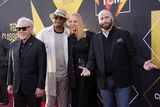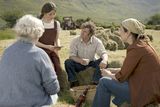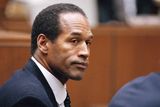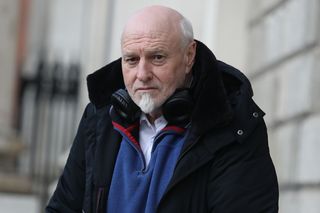When a child star is born: Shia LaBeouf and the perils of childhood stardom
Back in the mid-2000s, Shia LaBeouf was a big cheese. Breakout turns in Transformers and Indiana Jones 4 led to films with Martin Scorsese, David Ayer and Lars von Trier. But Shia was a troubled soul, prone to substance abuse and angry outbursts, and just as it was getting started, his career fell off a cliff.
In Honey Boy, we find out why. Written by LaBeouf and directed by Alma Har'el, this harrowing drama is based on the actor's chaotic childhood, part of which was spent in the questionable care of his dad, a manic army veteran and former rodeo clown. In the film, LeBeouf plays a fictionalised version of him, James Lort, Noah Jupe plays his child actor son Otis, and Lucas Hedges is the grown-up, f***ed-up Otis.
The film has been called a "glorified form of drama therapy", and if Honey Boy in any way reflects Shia's actual childhood, no wonder he's a bit of a banana.
Otis lives in a rundown LA trailer park, and his neighbours are working prostitutes who seem positively demure next to his raging, brutal father. LeBeouf is compellingly good as James Lort, who lives off his son's acting income but bitterly resents the boy's talent. Constantly undermined, emotionally and sometimes physically abused, Otis at one point is even put in the middle of a raging row between his parents, holding the phone and acting out his mother and father's traded insults. Poor Shia.
Mickey Rooney and Colleen Moore in Orchids and Ermine
Sadly, however, his early experiences are not unique, for child acting has always been a curiously high-risk occupation. One has to say that things have improved a great deal since the dark days when junior stars like Mickey Rooney and Judy Garland were treated like livestock by the studios, and that for every Garland or LeBeouf or Brittany Murphy there are a dozen examples of child stars who turn out perfectly alright. But early exposure to fame can have disastrous and lasting psychological effects, particularly if the performer's parents are not interested in protecting them.
Judy Garland is the patron saint of victimised child actors. On the stage by the age of two, Frances Gumm was part of a Vaudeville singing act with her sisters, and changed her name shortly before being signed by MGM, at 13. Her mother stood by while the studio mercilessly moulded her into a movie star image, putting caps on her teeth and rubber discs up her nose to change its shape, initiating cruel diets and feeding her amphetamines to suppress her appetite. The "ugly duckling", MGM executives called her, and the insult stuck: Garland would heroically battle drug and alcohol addiction for the rest of her life.
Her frequent co-star Mickey Rooney, who started out as a child actor in the silent era, appears on the surface to have been made of sterner stuff. But people have different ways of expressing or repressing trauma, and eight marriages and an addiction to sleeping tablets do not suggest a man entirely at peace with himself. Shirley Temple survived massive childhood stardom to become a highly respected US diplomat, but never forgot the long hours of hoofing or the weekly vinegar rinses of her famous curls that stung her eyes.
One of Judy Garland's junior rivals at MGM, Elizabeth Taylor was just 11 when she joined the studio, and would later say that her childhood ended the day she signed. MGM was, she said, a "big, extended factory" that controlled every aspect of her life, imposing strict daily regimens of training and classes, pulling teeth out to perfect her smile, and later inventing a carefully crafted romantic life her fans might deem appropriate. Liz Taylor was no victim, but the psychological scars were permanent.
Sometimes kid actors hoofed their way through childhood only to be ripped off by their guardians. Jackie Coogan became a huge star in the 1920s after co-starring with Charlie Chaplin in The Kid. By the time he was 21, he'd managed to put aside a cool $4m - or so he thought. His mother and stepfather had blown the lot, and poor Jackie ended up suing them.
Worse fates awaited child stars who got forgotten. In the 1962 schlock horror What Ever Happened to Baby Jane?, Bette Davis played a former child star whose subsequent oblivion turned her into a hallucinating lunatic, but the truth was usually more prosaic. The hugely talented child actor Rusty Hamer became a national favourite in 1950s America on the TV sitcom Make Room for Daddy. He had terrific presence, and a natural gift for comedy, but when Rusty hit 16, the work dried up, and in later years he worked on an oil rig. In 1990, at the age of 42, he shot himself: his brother said Rusty had never recovered from the sudden end of his acting career. Sawyer Sweeten, best known for playing Geoffrey on Everybody Loves Raymond, would meet a similar end.
Judy Garland in The Wizard of Oz
Brad Renfro shot to fame in the early 1990s after Joel Schumacher cast him in The Client. He was not quite 12 but looked older, and would later become a teen sex symbol after appearing in films like Apt Pupil. But no one seems to have been looking out for Brad, who began experimenting with alcohol and hard drugs in his early teens and died of an overdose at 25.
Drew Barrymore grew up in public after starring in ET at the age of seven. She hailed from a long line of famous actors who really ought to have known better, but by 12, she was a regular at Studio 54, and endured her first stint in rehab a year later.
Barrymore has worked hard to recover from her appalling childhood: Brittany Murphy never got the chance. She made her Broadway debut aged 10, and moved to Hollywood with her mother shortly after. Through her teens she worked steadily in film and TV, but would later develop addictions to prescription drugs, dieting and plastic surgery. Her misguided quest for perfection ended tragically on December 20, 2009, when the exhausted 32-year-old died of pneumonia and other complications.
Things have got better: Ryan Gosling, Scarlett Johansson, Brie Larson and Elisabeth Moss all acted professionally as children, and seem to have managed the experience pretty well, as did Harry Potter stars Daniel Radcliffe and Emma Watson. In 2016, Watson gave a lecture on gender equality at Davos; it's hard to imagine Judy Garland doing that.
Studios have less freedom to behave badly, and parents hopefully have become better at protecting their precociously talented charges. But every time I see a charming kid tap dance their way across the screen, I wonder if someone's looking after them.
Drew Barrymore in ET
Join the Irish Independent WhatsApp channel
Stay up to date with all the latest news














